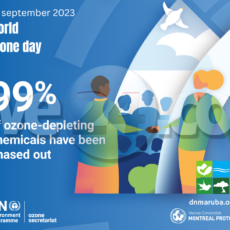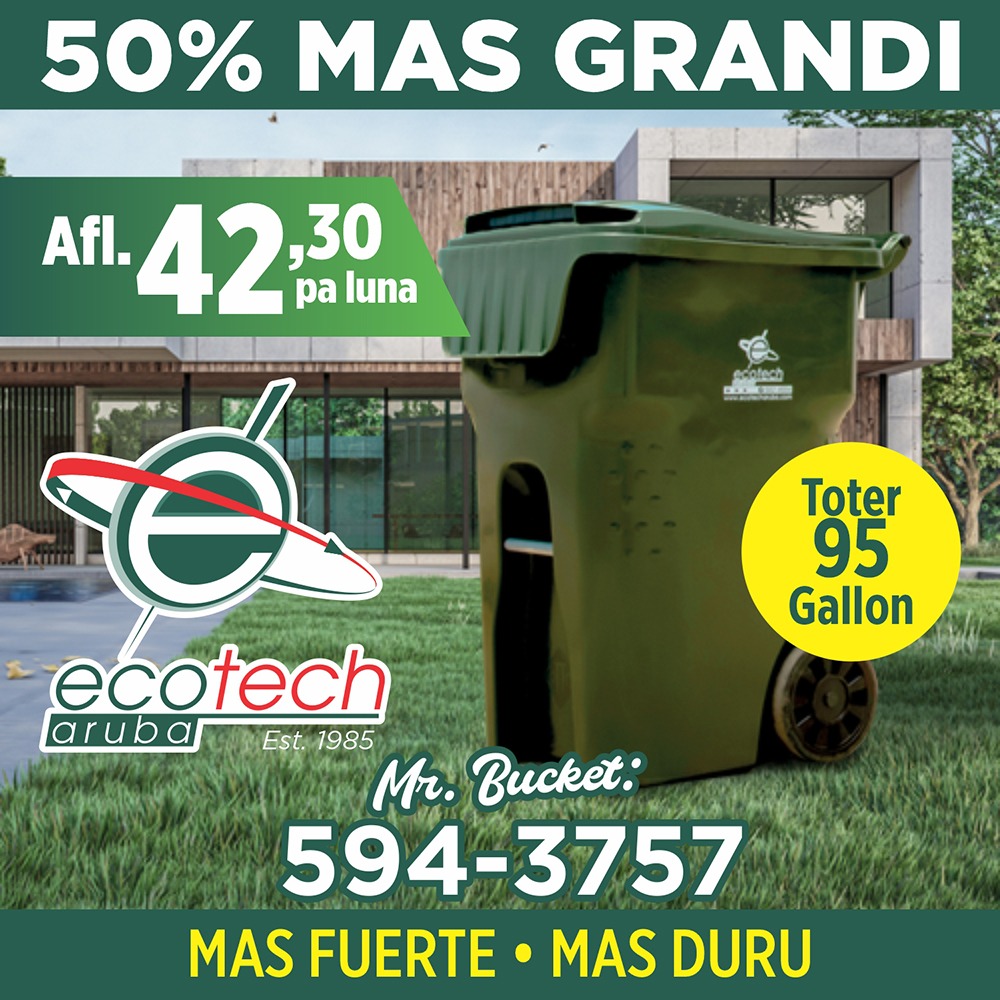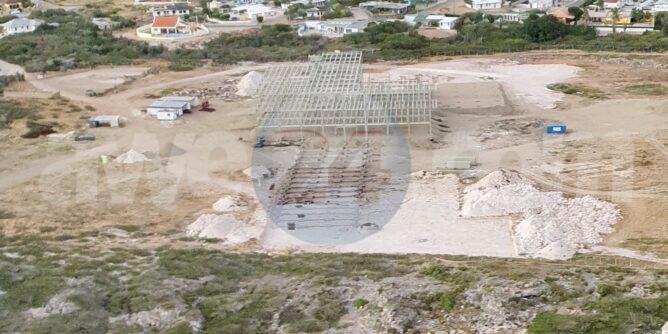
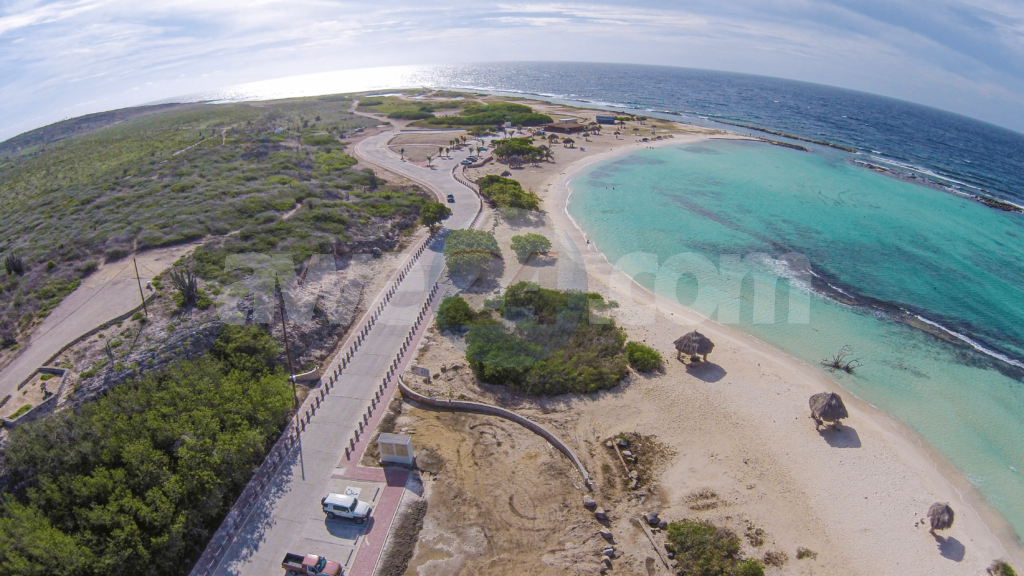
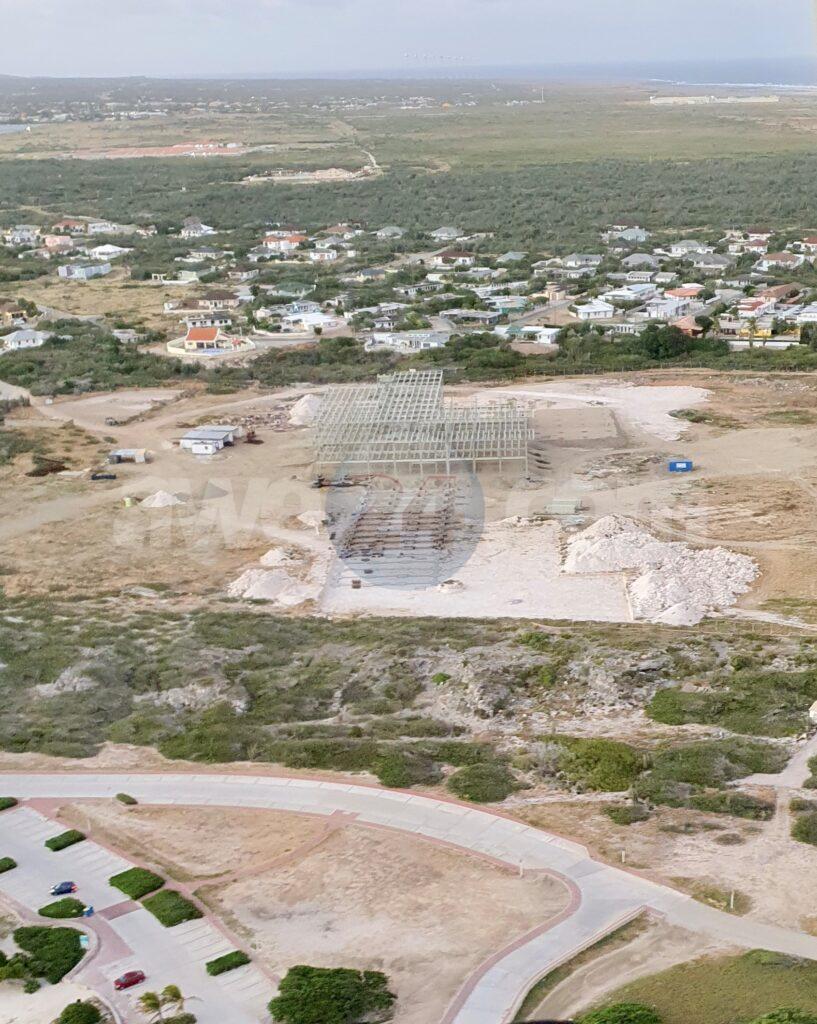
ORANJESTAD, ARUBA – Fundacion Parke Nacional Aruba (FPNA) recientemente a uni su mes na e caso cu a wordoentama door di habitantenan di Sero Colorado contra Gobierno di Aruba cu a aproba e proyecto di hotel. Como un organisacion di conservacion profesional independiente, FPNA no ta contra di desaroyo economico di e isla, pero esakimester wordo haci sostenibel pa garantisa e salud di nos ecosistemanan y integridad di e biodiversidad. FPNA tacuestiona si un Environmental Impact Assessment (EIA) adecua a wordo haci pa un desaroyo di e magnitud aki, especialmente mirando cu no tin accionan di mitigacion identifica pa un Sistema di Maneho Sostenibel pa e fase operacional.
FPNA ta encarga cu e conservacion y maneho di tur areanannatural protegi tanto terestre y marino, cu atencion napresevacion, protecion, y restauracion di diversidad, salud, y resiliencia di e ecosistemanan natural, pero tambe pa informa, conecta y stimula participacion di bishitantenan di naturalesavia exprencianan sostenibel den naturalesa. Paso naturalesa no conose barera, y especienan ta migra bay y bin ambos riba tera y den lama, y mirando cu e menasanan afectando e estado di naturalesa y e areanan natural protegi, FPNA recientemente a cuminsa transforma di un Organisacion pa Maneho di Parke pa un Organisacion pa Maneho y Conservacion. E transicionaki ta encera un ampliacion di e atencion pa inlcuiconservacion di naturalesa mas leu cu e areanan natural protegi y pa traha cu mas diferente stakeholders. Como un defensor pa conservacion di naturalesa, FPNA ta urgistakeholders pa intensifica nan esfuerso pa preserva, proteha, y restaura nos naturalesa – hunto cu e ecosistema, especienan, y e comunidad cu e ta carga – riba e caminda pa recuperacion. Den transcurso di e ultimo añanan, FPNA continuamente tatraha hunto cu diferente stakeholder pa stop of mitiga e destruccion di naturalesa pafor di e areanan natural protegi, cutin impactonan inmediatio ariba e salud y resiliensa di e naturalesa den e areanan protegi. FPNA semper ta prefera di dialoga pa asina hunto yega na solucion y ta opta pa cana e caminda legal ora cu no tin otro opcion pa por stop y of mitiga mas distruccion di naturalesa. Esaki tabata e caso recientemente den e caso entama contra Aruba Ocean Villas y Gobierno di Aruba, caminda cu e desaroyo hotelero ambos den e fase di construccion y tambe operacion lo impacta e ecosistema y biodiversidad di e mangelnan y yerbenan di lama den e area protegi na Commandeursbaai.
Den e caso aki, di Three Rivers Real Estate N.V., un hotel grandi ‘all-inclusive’ – di inicialmente 600 camber – ta den construccion na Sero Colorado, cien meter leu di e areamarino protegi di Sero Colorado cu ta wordo maneha pa FPNA. E proyecto hotelero lo tin impacto directo y indirecto riba e ecosistema marino y e biodiversidad di e area marino protegi. Segun e investigacion di e estado di rifnan di CARMABI, e area especifico aki ta e unico area na Aruba cuainda ta den un estado saludabel. Esaki ta haci e area akiunico y e rason pakico FPNA a uni su mes na e caso entama pa e habitantenan di Sero Colorado. E proyecto aki a wordoaproba a base di un Environmental Impact Assesment producipa Sustainable Solutions Consulting N.V. cu no a wordo hacidi acuerdo cu e requisito y normanan aplicabel. E raport aki nisikiera a cumpli pa haci e investigacion di e impacto aribaocho (8) topico cu Gobierno di Aruba mes a identifica pa determina si ta aproba e proyecto, si of no, y bou di kicondicionnan. Consecuentemente, un Enviromental Impact Assessment cu ta indica den e rapport mes cu NO a ni investiga tur e 8 topiconan otorga pa Gobierno, y cu ta flaco y incompleto di 22 pagina produci pa Sustainable Solutions Consulting N.V. y aproba pa Gobierno di Aruba, por wordoconsidera un documento di ‘greenwashing’ pa asinafacilmente cumpli cu e lista di criteria pa obtene un permiso di construccion, cu nuin intencion real di limita of mitiga e impacto riba e medio ambiente di e desaroyo aki.
Durante e proceso di e Environmental Impact Assessment, FPNA a wordo acerca pa Sustainable Solutions ConsultingN.V. pa entrega comentario riba e raport preliminar, camindaFPNA a expresa su precupacionan y a haci diferente preguntacu ta regarda ambos e fase di construccion y operacion, entre otro: Con e proceso di consulta a wordo diseña y ehecuta y cua otro experto, organisacion, comision, y of stakeholders – gubernamental y no gubernamental- a wordo consulta? Pakicocierto criteria no a wordo adresa? Pakico no a indica nuinposibel menasa of risico, y mitigacion of maneho di risico, specialmente considerando cu e proyecto lo incluiparkeerplaats, casino, spa, un sport club, pool y restaurant? Kico ta e aspectonan di sostenibilidad proponi pa e hotel? Con sostenebilidad a wordo incorpora den e proceso di diseño y operacion? Pakico no a wordo menciona nuin caminda e capacidad di carga di e area y e posibel impacto y risico di ehotel den e areanan rond di dje, incluyendo e bida marino?Con y na ki momento e investigacion di biodiversidad a wordo haci? P.e. frecuencia, orario, y temporada; y determinacion corecto di especienan? Y: Ki methodo a wordouza? Remarcabel ta, e preguntanan aki nunca a wordocontesta y niun comentario di FPNA a wordo incorpora den e version final, cual tabata identico na e version preliminar.
Parti di e conclusion di e Environmental Impact Assessmentta bisa cu e actividadnan di e proyecto lo no tin influenciaariba e medio ambiente y ecologia local. Un conclusion asinaaki ta pa FPNA un ehempel cu no tin conosemento nicomprondemento di e paisahe sensitivo di Aruba, y ta gravemente ta haci falta den e investigacion y analysis di e Environmental Impact Assessment. FPNA tin e conosementofor di observacionan extenso cu e area di Sero Colorado ta hogar di y/of area di alimentacion di especienan na riesgo di extincion y endemico manera Coneu y Shoco. Otroespecienan protegi pa ley den e area ta, pero no limita na, Cododo y diferente tipo di Cadushi. Parhanan importante den e area henter aña of cu temporada ta, pero no limita na: Ganshi, Sternchi, Meuwchi, Swalchi, Snepi, Totolica di awa, Lopi, Kibra cocolishi, Ala blanca, Buladeifi, Totolica, Bubi, Skerchi, Gabilan piscador, y Warawara. E especienan di parhaaki no ta habita tur parti riba e isla. Ademas e areanan na costa y playanan ta frecuenta door di diferente especienan di turtuga, e bahianan ta contene diferente especienan marinosensitivo na polucion y strobacion. E aumento den actividad y e resultado di polucion di luz y zonido for di e proyecto lo sin duda impacta e turtuga cu ta pone webo, y e Sternchi cu tamigra pa uza e parti aki di Aruba su costa pa descansa, colectacuminda y reproduci – incluyendo 15-30% di e populacionmundial di e Sternchi grandi (Cayenne) y mas cu 90% di e populacion di caribe di Sternchi comun. Mas ainda, e raport di e Environmental Impact Assessment no ta indica cu e tera a wordo suficiente investiga y evalua, incluyendo e minanan, tunnelnan, grotnan, y gulidonan, cu tambe tin un funcion pa aire pasa y ta contene bestianan salvahe, manera diferente especienan di raton di anochi y invertebrado, incluyendo un haraña endemico Amblypygid (zweepspin).
Basa riba e Environmental Impact Assessment presenta pa e proyecto di un hotel ‘all-inclusive’ na Sero Colorado, FPNA ta argumenta cu conosemento di experto y participacion di e publico ta haci falta. Mirando cu participacion di stakeholdermester ta un parti significante den un proceso pa conduci un Environmental Impact Assessment, incluyendo e impactosocio-economico, cultural, y salud publico, tanto di beneficioy negativo. Pa e motibo aki e proyecto mester wordo para, y un Environmental Impact Assessment nobo y adecua mesterwordo haci pa e proyecto aki. Adicionalmente, un Sistema di Maneho Sostenibel mester ta parti di e proyecto pa sigura cu impactonan y accion di mitigacionan ta wordo identifica y adresa na tempo. Por ehempel, hotel tin e tendencia di atraeespecienan invasivo manera djaca, boa y diferente tipo di parha no local cu tin un posibilidad halto di impacta e medio ambiente den e area y bestianan salvahe (terestre y marino), pa menciona algun problema. Con e hotel di escala grandi akilo mitiga e impactonan aki no ta conoci.
Independiente di casonan den corte, FPNA lo sigui lucha pasu vision di crea un futuro sostenibel pa Aruba; uno cu lo tin balanse real entre bienestar economico, social, y ecologicoriba un termino largo. Eleva educacion y concientisacion, mehora operacion sostenibel, plania y diseña, inverti mas den recurso pa analysis scientifico y pa monitoreo, mehorafuncionamento legal y regulatorio – incluyendo handhaving, y desaroya fondonan dedica pa salud di ecosistemanan y biodiversidad, y maneho di polucion, desperdicio, y areanancu awa ta pasa, ta keda importante pa e decadanan nos dilantipa avansa Aruba den un sociedad y destinacion sostenibel
FPNA in court to mitigate environmental impact of hotel development in Sero Colorado.
ORANJESTAD, ARUBA – Fundacion Parke Nacional Aruba (FPNA) has recently joined a court case that was initiated by a Sero Colorado community group against the Government of Aruba, who approved the hotel project. As an independent professional nature conservation organization, FPNA is notagainst economic development of the island, but this needs to be done sustainably to ensure long term health of ecosystems and integrity of the biodiversity. FPNA questions if a proper Environmental Impact Assessment (EIA) was made for aproject of this magnitude, especially as there are no mitigation actions identified for a Sustainable Management System for the operational phase.
FPNA is charged with conservation and management of all terrestrial and marine protected nature areas, with a focus on preserving, protecting, and restoring the diversity, health, and resilience of the natural ecosystems, but also to inform, connect and engage visitors of nature through sustainable nature experiences. Because nature knows no boundaries, as species migrate back and forth on land and in water, and in view of the increasing threats affecting the state of nature and the protected areas, FPNA has recently started transitioningfrom a Park Management Organization to a Conservation Management Organization. This transition entails a broadening of attention to include nature conservation beyond the protected nature areas and to work with different stakeholders. As an advocate for nature conservation, FPNAurges stakeholders to step up their efforts to preserve, protect, and restore nature – along with the ecosystems, species, and communities it supports – on the path to recovery. Over the past year, FPNA has continuously worked behind the scenes with different stakeholders to halt or mitigate the destruction of nature outside the protected nature areas, that immediately impacts the health and resilience of the nature within the protected areas. FPNA will always choose dialogue to come to acceptable solutions but when such dialogue stagnates, FPNA will take legal course of action by going to court to halt and or mitigate the further destruction of nature. This was the casewith the recent court case against Aruba Ocean Villas and the Government of Aruba, where a hotel development was approved that both in the construction and operational phase impacts the ecosystem and biodiversity of the adjacentprotected mangrove and seagrass area at Commandeursbaai.
In this case of the Three Rivers Real Estate N.V. large-all-inclusive hotel – of initially 600 rooms – being built at SeroColorado, a couple of hundred meters away from the Marine Protected Area (MPA) Sero Colorado managed by FPNA, the development project will have direct and indirect impacts on the marine ecosystem and the biodiversity of the MPA. This area is unique in that it is the only area which according to the reef study by CARMABI is still in a healthy state. This is the reason why FPNA has joined the court case initiated by a SeroColorado community group, because the project was approved based on an EIA produced by Sustainable Solutions Consulting N.V. which was not conducted thoroughly and transparent and did not even comply with the eight (8) criteriaindicated by the then Minister of Spatial Planning, Infrastructure and Environment. Ultimately, the resulting meager and lacking, 22-page EIA approved by the Government of Aruba, can be considered a greenwashing document used to quickly tick off the necessary boxes on the criteria list for obtaining the necessary building permits, with no real intention of limiting or mitigating the environmental impacts of the development.
During the EIA process, FPNA was approached by Sustainable Solutions Consulting N.V. to deliver feedback on the draft EIA, whereby FPNA expressed concerns and posed numerous questions regarding both the construction and operational phases, including: How was the consultation process designed and executed and which other experts, organizations, commissions and/or stakeholders have been consulted – government and non-government? Why were certain criteria, not addressed? Why is there no identification whatsoever of possible threats and risks, and risk mitigation and management, especially considering the project will include car parking, a casino, spa, a sport club, swimming pools and restaurants? What are the sustainability aspects of the proposed resort? How is sustainability incorporated into the design and operational processes? Why is there is no mention whatsoever of the carrying capacity of the area and overflow from resort and possible impact, risks to the surroundings, including the marine environment? How and when was the biodiversity research carried out? i.e. frequency, time and seasons; correct determination of species? And: Which methods were used? Remarkably, these questions were never answered and none of FPNA’s feedback was incorporated into the final version of the EIA, which happened to be identical to the draft version.
Part of the conclusion of the EIA states that the activities of the project will have no influence on the local environment and ecology. Such conclusions are for FPNA one of several examples that knowledge and understanding of the sensitive xeric landscape of Aruba is gravely lacking in this EIAs research and analysis. FPNA knows from own extensive observations that the Sero Colorado area is home to and/or feeding grounds of highly endangered and/or endemic species such as the Aruban Cottontail and Aruban Burrowing Owl. Other species protected by law found in the area are, but not limited to, Whiptail lizards and Cacti species. Important birds found in the general area all year round or on a seasonal basis are, but not limited to: Brown Pelican, Tern species, Gulls species, Swallow species, Sandpipers, Turnstones, Plovers, Oystercatchers, Bare-Eyed pigeons, Eared Doves, Common Ground Doves, Brown Booby, Magnificent Frigate birds, Ospreys and Crested Caracara. The aforementioned birdsinclude species not found everywhere on the island. The coastal area and beaches are frequented by different species of sea turtle, the shallows contain numerous marine vertebrate and invertebrate species sensitive to pollution and disturbance. The increase in activity and the resulting light and noise pollution from the project will undoubtedly impact nesting sea turtles and the migrating terns that use this part of Aruba’scoast for resting, foraging and reproduction – including 15-30% of the world’s population of Cayenne tern and over 90% of the Caribbean’s population of common terns. Furthermore, the EIA report does not indicate that the soil layer has been sufficiently researched and evaluated, including mines, tunnels, fissures, and sinkholes, which also function as air passages and contain resident wildlife, such as different species of bats and invertebrates, including an endemic species of Amblypygid (Whip spider).
Based on the EIA presented for the Sero Colorado all-in hotel project, FPNA argues that expert knowledge and public involvement is significantly lacking, as stakeholder engagement should be a significant part of an EIA process, including the inter-related socio-economic, cultural, and human health impacts, both beneficial and adverse. Therefore,the project should be halted, and a new, proper EIA made for this project. Additionally, a Sustainability Management System should be part of the project to ensure that unpredicted impacts or failed mitigation measures are identified and addressed in a timely fashion. E.g. hotels tend to attract invasive species, including rats, boas, and several types of non-native birds which have a high chance of impacting the surrounding environment and wildlife (terrestrial and marine) – to name but a few issues. How will this large-scale hotel be structurally mitigating these impacts?
With or without court cases, FPNA will continue striving for her vision to create a sustainable future for Aruba; one in which there is a true balance between economic, social, and ecological wellbeing for the long term. Increasing education and awareness, improving sustainable operations, planning and design, investing more resources in scientific analysis and monitoring, enhancing legal and regulatory functions – including enforcement, and developing dedicated funding for biodiversity and ecosystem health, and water(shed), pollution and waste management, will remain key in the coming decades in advancing Aruba in becoming a sustainable society and tourism destination.
FPNA in rechtszaak voor mitigatie vanmilieueffect van hotelontwikkeling in Sero Colorado
ORANJESTAD, ARUBA – Fundacion Parke Nacional Aruba (FPNA) heeft zich onlangs aangesloten bij een rechtszaak die werd aangespannen door een groep buurtbewoners uit Sero Colorado tegen de regering van Aruba, die het hotelproject goedkeurde. Als onafhankelijke professionele natuurbeschermingsorganisatie is FPNA niet tegen de economische ontwikkeling van het eiland, maar dit moet wel op duurzame wijze geschieden om de integriteit van de biodiversiteit en de gezondheid van ecosystemen op lange termijn te waarborgen. FPNA betwist of er een deugdelijke en betrouwbare milieueffectrapportage (MER) is gemaakt voor een ontwikkelingsproject van dergelijke omvang, vooral omdat er ook geen mitigerende maatregelen zijn vastgesteld voor een duurzaam beheersysteem voor de operationele fase.
FPNA is belast met het beheer van alle beschermde terrestrische en mariene natuurgebieden, met een focus op het behoud, de bescherming en het herstel van de biodiversiteit, en de gezondheid en veerkracht van de natuurlijke ecosystemen, maar ook om bezoekers met de natuur te verbinden en te betrekken door middel van voorlichting en duurzame natuurbelevenissen. Omdat de natuur geen grenzen kent en vele terrestrische en mariene soorten – soms zelfs dagelijks – migreren tussen natuurgebieden en daarbuiten, maar ook vanwege de toenemende bedreigingen die de staat van de natuur en de beschermde gebieden beïnvloeden, is FPNA onlangs begonnen aan een transitie van een oorspronkelijke Park Management Organisatie naar eenmoderne Natuurbehoud en -beheer Organisatie. Daarmee is de aandacht ook verbreed naar natuurbehoud buiten de beschermde gebieden en wordt in toenemende mate de samenwerking gezocht met verschillende belanghebbenden.
Vanuit haar natuurbehoudsrol dringt FPNA bij de belangrijkste belanghebbenden erop aan om zich in te spannende natuur te behouden, te beschermen en te herstellen. Het afgelopen jaar heeft FPNA achter de schermen continu samengewerkt met verschillende belanghebbenden om de vernietiging van natuur buiten de beschermde gebieden, die onmiddellijk van invloed zijn op de gezondheid en veerkracht van de natuur binnen de beschermde gebieden, te stoppen of te beperken. FPNA zal ten alle tijden de voorkeur geven aan het voeren van een oplossingsgericht dialoog met relevante belanghebbenden – inclusief de overheid, maar als dezestagneert, zal FPNA de juridische weg in moeten slaan en de nodige stappen nemen om de verdere vernietiging van de natuur te stoppen en of te verminderen. Dit was ook het geval met de recente rechtszaak tegen Aruba Ocean Villas en de regering van Aruba, waarbij hotelontwikkeling werd goedgekeurd die zowel in de bouw- als operationele fase een impact zou hebben op het ecosysteem en de biodiversiteit van het aangrenzende beschermde mangrove- en zeegrasgebied bij Commandeursbaai.
In het geval van het grote, ‘all-inclusive’ hotel van Three Rivers Real Estate N.V. – van aanvankelijk 600 kamers – datmomenteel wordt gebouwd in Sero Colorado, een paar honderd meter verwijderd van het Marine Protected Area (MPA) Sero Colorado beheerd door FPNA, zal het ontwikkelingsproject directe en indirecte gevolgen hebben voor het mariene ecosysteem en de biodiversiteit van de MPA. Juist dit gebied is volgens het onderzoek van CARMABI naar de staat van de Arubaanse koraalriffen, het enige resterende gebied met riffen in een gezonde staat. Reden dan ookwaarom FPNA zich heeft aangesloten bij de rechtszaak die is aangespannen door buurtbewoners van Sero Colorado. FPNAis van mening dat het hotelproject is goedgekeurd op basis van een MER geproduceerd door Sustainable Solutions Consulting N.V. die niet grondig en transparant is uitgevoerd en die ook niet voldoet aan de acht (8) criteria die door de toenmalige minister van Ruimtelijke Ordening, Infrastructuur en Milieu zijn opgesteld. Uiteindelijk kan het resulterende magere en gebrekkige 22 pagina’s tellende MER dat door de overheid is goedgekeurd, worden beschouwd als een ‘greenwashing-document’ dat enkel bedoeld was om snel de noodzakelijke hokjes op de criterialijst af te vinken voor het verkrijgen van de benodigde bouwvergunningen, zonder deintentie om de milieueffecten van het ontwikkelingsproject te mitigeren of te beperken.
Tijdens het MER-proces is FPNA benaderd door SustainableSolutions Consulting N.V. om feedback te geven op hetconcept-MER, waarbij FPNA haar zorgen uitte en tal van vragen stelde over zowel de bouw- als de exploitatiefase, waaronder: Hoe is het consultatieproces vormgegeven en uitgevoerd en welke andere overheid- en niet-ambtelijke specialisten, organisaties, commissies en/of stakeholders zijn geraadpleegd? Waarom zijn bepaalde criteria niet aan de orde gesteld c.q. beantwoord? Waarom is er geen enkele identificatie van mogelijke bedreigingen en risico’s, en risicobeperking en -beheer, vooral gezien het feit dat het project parkeerplaatsen, een casino, spa, een sportclub, zwembaden en restaurants zal omvatten? Wat zijn de duurzaamheidsaspecten van het voorgestelde resort? Hoe wordt duurzaamheid verwerkt in de bouw- en operationele fasen en processen? Waarom wordt er met geen woord gerept over de draagkracht van het gebied en het ‘uitstralen’ vanmogelijke impacts en risico’s voor de omgeving, waarondervoor het mariene milieu? Hoe en wanneer is het biodiversiteitsonderzoek uitgevoerd? D.w.z. frequentie, tijden en seizoenen, juiste bepaling van soorten enz.? En: Welke methoden werden er gebruikt? Opmerkelijk is dat deze vragen nooit zijn beantwoord en dat geen van de feedback van FPNA is verwerkt in de definitieve versie van de MER, die toevallig identiek was aan de conceptversie.
In de conclusie van de MER staat dat de activiteiten van het project “geen invloed hebben op de lokale omgeving en ecologie”. Een dergelijke conclusie is voor FPNA een voorbeeld van een ernstig gebrek aan kennis in dit MER-onderzoek en -analyse met betrekking tot het kwetsbare, droge landschap van Aruba. FPNA weet uit eigen, uitgebreide waarnemingen dat het Sero Colorado-gebied de thuisbasis enhet voedselgebied is van zeer bedreigde en/of endemischesoorten zoals de katoenstaartkonijn (Coneu) en de Arubaanse holenuil (Shoco). Andere wettelijk beschermde soorten die in het gebied voorkomen zijn bijvoorbeeld de Arubaanse renhagedis (Cododo) en diverse cactussoorten. Vogelsoortendie het gehele jaar door of in het broedseizoen in het gebied worden aangetroffen, zijn onder andere: de bruine pelikaan, diverse sternsoorten, meeuwensoorten, zwaluwsoorten, strandlopers, plevieren, scholekster, naaktoogduif, geoorde treurduif, musduif, bruine boobie, fregatvogel, visarend en de kuifcaracara. Deze opsomming omvat soorten die niet overal op het eiland voorkomen. Verder wordt het kustgebied en de stranden bezocht door verschillende soorten zeeschildpadden, en bevinden zich in het ondiepe kustwater tal van gewervelde en ongewervelde mariene soorten die gevoelig zijn voor vervuiling en verstoring. De toename van menselijk activiteit en de uit dit project voortvloeiende licht- en geluidsoverlast zal ongetwijfeld van invloed zijn op nestelende zeeschildpadden en de migrerende sternen die dit deel van de kust van Aruba gebruiken voor rust, foerageren en voortplanting – waaronder 15-30% van de wereldbevolking aan Grote (“Cayenne”) stern en meer dan 90% van de Caribische populatie aan visdiefjes. Bovendien geeft hetMER-rapport niet aan dat de bodemlaag voldoende is onderzocht en geëvalueerd, met inbegrip van de mijnen, tunnels, kloven en zinkgaten, die ook als luchtpassages fungeren en een thuisbasis zijn voor verschillende soorten zoals vleermuizen en ongewervelde dieren, waaronder een endemische soort Amblypygi (zweepspin).
Op basis van de MER die is opgemaakt voor het all-in hotelproject in Sero Colorado, stelt FPNA dat deskundige kennis en betrokkenheid van het publiek ook aanzienlijk ontbreekt. Aangezien betrokkenheid van belanghebbenden een belangrijk onderdeel van een MER-proces zou moeten zijn, inclusief de onderling gerelateerde sociaaleconomische, culturele en menselijke gezondheidseffecten, zowel gunstig als nadelig. Daarom zou volgens FPNA het project moetenworden stopgezet en een nieuwe, deugdelijke MER worden opgesteld voor dit project. Daarnaast moet een duurzaamheidsbeheersysteem deel uitmaken van het project om ervoor te zorgen dat onvoorziene effecten of tekortkomende mitigatiemaatregelen tijdig worden geïdentificeerd en aangepakt. Hotels hebben bijvoorbeeld de neiging om invasieve soorten aan te trekken, waaronder ratten, boa’s en verschillende soorten niet-inheemse vogels die veelal het omliggende natuur en fauna (zowel terrestrisch en marien) in negatieve zin te beïnvloeden, om maar eenvoorbeeld te noemen. Hoe gaat dit grootschalige hotel deze gevolgen structureel mitigeren en/of voorkomen?
Met of zonder rechtszaken, zal FPNA haar visie van een duurzame toekomst voor Aruba blijven nastreven; eentoekomst waarin er een werkelijk evenwicht bestaat tussen economisch, sociaal en ecologisch welzijn voor de lange termijn. Het verbeteren van het onderwijs en het vergroten van de bewustzijn, het verbeteren van duurzame processen, planning en ontwerp, het investeren in wetenschappelijke analyse en monitoring, het verbeteren van wet- en regelgevingfuncties (inclusief handhaving), en het ontwikkelen van specifieke financiering voor het verhogen van de biodiversiteit en de gezondheid van ecosystemen, en duurzame water- en afvalbeheer, zullen de komende decennia de sleutelacties blijven in het bevorderen van Aruba tot eendaadwerkelijke duurzame samenleving en toeristische bestemming.





